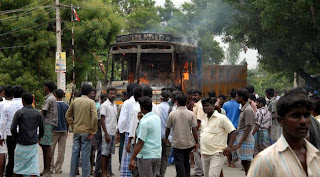If you pass by Presidency College and take a close look
at its lawns, you would notice, on most days, plastic cups, papers,
broken test tubes, rotting food packets and an assortment of rubbish.
And the college is not unique in presenting this sight.
Dirty
lawns, stinking toilets and unclean classrooms have become a prominent
feature of city colleges and the reason for this lack of maintenance is
the same everywhere. College officials are unanimous in blaming the
situation on the lack of appointment of class-IV workers that include
cleaners, sweepers, gardeners, helpers, conservancy workers, peons,
library and laboratory assistants, in the last fifteen years.
The
cleaning of lawns in most colleges takes place only when there are
important visits, say staff members. The government has not appointed
conservancy workers, and the colleges have a tough time hiring help,
says a lecturer at Queen Mary’s College. “No one wants to clean toilets
in colleges for Rs. 2,500. They can definitely earn much more as
domestic workers,” she says.
In co-educational institutions, the shortage of female sanitary workers leads to poor maintenance of women’s toilets.
“Sometimes,
the students do not know much about hygiene and we cannot impose
stricter rules or penalise them,” says a lecturer at Bharti Women’s
College.
Teaching in poorly-maintained classrooms
amidst the pervasive stench from unclean toilets is difficult but they
are getting used to it, says a lecturer at Presidency College. “We have
written to the government several times but have been asked to outsource
the work,” she says. Most government colleges outsource the cleaning
work and route money from the PTA fund.
Data with the
Tamil Nadu Association of Non-Teaching Staff of Aided Colleges reveals
there are at least 1,738 vacancies for class-IV workers in nearly 164
colleges across the State.
The Pachaiyappa Trust,
for instance, say sources, has not filled up 116 vacancies for cleaners,
sweepers and helpers, in five of its colleges, in the past ten years.
“Though
the management tries to employ contract workers by offering extra
remuneration, it is very difficult to retain them unless the government
standardises their work and salaries,” say a non-teaching staff member
of Kandaswamy Naidu College.
There are also many vacancies for the post of museum keepers (helpers in zoology labs).
“In
the absence of government recruiment, we are forced to hire people with
minimum qualifications. This often leads to theft or damage of
equipment, says,” says G. Mohan, a helper from Thiagarajar College.
Also,
colleges often prefer to spend money on hiring sanitary workers rather
than employing assistant librarians and laboratory technicians. “Those
who work in schools can hope to educate themselves and get promoted as
teachers after many years but there is no incentive like that in
colleges,” says a lab assistant at Women’s Christian College.
Members
of the Tamil Nadu Association of Non-Teaching Staff of Aided Colleges
point out that due to these unfilled vacancies, every staff has to do
the work of at least four others. “Last year, the government promised
that it would fill up the vacancies, but only the clerical positions
have been filled so far,” says P. Kanakarajan, secretary of the
Association.


















